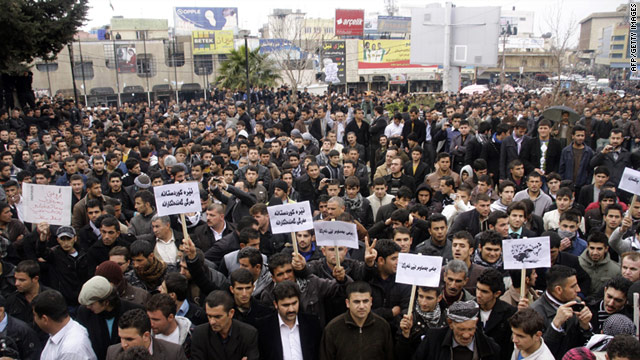David L. Chaplin II
Impunity Watch, Asia
MANAMA, Bahrain – At least 50 people were wounded when soldiers opened fire on an apparently peaceful protest Friday.
Anti-government protesters streamed back into their former stronghold of Pearl Square in Bahrain’s capital Manama, witnesses said, after the army and riot police withdrew.

Pearl Square, which has become for Bahrain what Cairo’s Tahrir Square, was for Egypt.
The protesters were kissing the ground in joy and taking pictures of about 60 police vehicles leaving the area.
“We are victorious,” the protesters chanted.
“Down with the king, down with the Khalifas,” they cried, referring to the kingdom’s ruling family. Anger among the overwhelmingly Shia Muslim demonstrators towards the Sunni dynasty that has ruled Bahrain for more than 200 years is now virulent.
The protest has called for the dissolution of the 2002 constitution and the formation of a new panel to draw up another new constitution.
They have called for the release of political prisoners and an end to torture and prosecution of journalists and human rights activists.
“They have done nothing for us in the past except discriminate against us,” said one nurse, sobbing against a hospital gurney. “Now their new trick is to kill us.”
Later reports show that 60 to 80 people were taken to Salmaniya hospital after being hit by rubber bullets or inhaling teargas. A doctor said the hospital was full and did not have enough oxygen to deal with the casualties.
The crown prince was asked by the king to start a national dialogue “with all parties” to resolve the crisis in the island kingdom, where six have died and hundreds have been wounded since protests by the Shiite majority began five days ago.
Bahrain’s Shiite opposition on Saturday responded by rejecting any dialogue with the Sunni royal family until “tanks are off the streets” and the army stops “shooting at peaceful protesters.”
Khalil al-Marzook, a senior member of Al Wefaq opposition bloc, said the “atmosphere for dialogue,” led by the crown prince “is not right.”
Some doctors and medics on emergency medical teams were in tears as they tended to the wounded. X-rays showed bullets still lodged inside victims.
This is a war,” said Dr. Bassem Deif, an orthopedic surgeon examining people with bullet-shattered bones.
“Police attacking protesters here at hospital in Bahrain. Tear gas inside. Panic,” tweeted New York Times reporter Nicholas Kristof.
“…They were shot to kill; they were not shot to break down their gathering.”
“We don’t care if they kill 5,000 of us,” a protester screamed inside the forecourt of the Salmaniya hospital, which has become a staging point for Bahrain’s raging youth. “The regime must fall and we will make sure it does.”
“No to Sunni; no to Shia,” they cried at one point. “We are all Bahraini.”
U.S. President Barack Obama spoke with the king of Bahrain, Hamad bin Isa Al-Khalifa, and again urged his government to show restraint against “peaceful protesters,” the White House said.
“If the US walks away from us, this regime will continue to come for us,” said Ismail in the shadow of the graveyard. “There is no option but to press ahead. This is our moment.”
For more information, please see:
MSNBC News – Bahrain protesters reclaim central square – 19 February 2010
The Guardian – Bahrain protest: ‘The regime must fall, and we will make sure it does’ – 18 February 2010
International Business Times – More protest in Bahrain as religious fault line widen – 18 February 2010
 Kim unlikely to be affected by Egyptian Revolution due to information control (Photo courtesy of AP)
Kim unlikely to be affected by Egyptian Revolution due to information control (Photo courtesy of AP)

